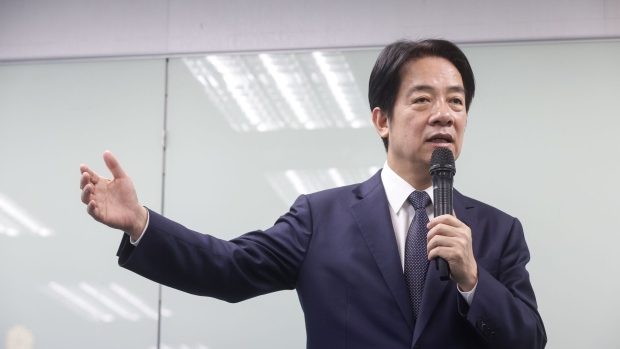Oct 27, 2023
Taiwan Parties Push Alliance Talks in Bid to Beat Ruling DPP
, Bloomberg News

(Bloomberg) -- Taiwan People’s Party leader Ko Wen-je, running second in most polls ahead of January’s presidential election, said there have been multiple meetings with the Kuomintang on a potential alliance against the frontrunner, the ruling Democratic Progressive Party.
“We know that time is running out.” Ko said at a briefing in Taipei. “Our staff have been communicating with each other frequently, and we hope to reach a conclusion as soon as possible.”
The governing DPP’s candidate, Vice President Lai Ching-te, has led local polls for months. That has prompted his rivals to openly discuss an alliance, which could be a game-changer for the election — but which must be agreed by a late November deadline for registering candidates.
Any tie-up would be welcomed by China, which is concerned at the pro-independence stance of the DPP. Both Ko’s party and the third-placed Kuomintang, or KMT, which ruled the island for decades, favor closer ties with Beijing.
The Kuomintang’s candidate Hou Yu-ih, the mayor of New Taipei City, earlier this week urged Ko to agree to enter the race together on a joint-ticket, as president and vice president. Hou also indicated that he would be open to being Ko’s deputy, depending on how talks proceed.
Ko, who had previously pushed for alliance talks to end this month, said the “real deadline” for a conclusion is November and that “we are used to fighting till the last minute.”
Still, he warned that things may get more difficult the longer talks drag on.
China’s concerns that the DPP will retain the presidency when incumbent Tsai Ing-wen steps down were underscored earlier this week when the Communist Party’s Global Times newspaper condemned the candidacy of Terry Gou, a former KMT supporter whose independent bid for the presidency is seen as weakening opposition chances. Chinese regulators also announced a probe of the tech giant Gou founded, which has since shed billions in market value.
A TVBS poll released earlier this week showed some 33% of Taiwanese voters support the DPP’s Lai Ching-te, against 24% for Ko and 22% for the KMT’s Hou.
Still, a coalition of different political parties would be rare for Taiwan. In 2004 the People First Party joined forces with the KMT in a bid to dethrone the DPP president. The alliance lost by 0.2% — the closest presidential vote in the island’s history.
The KMT and Taiwan People’s Party have negotiated on a possible coalition previously, though they have disagreed on how to determine who runs as president and deputy. The KMT has proposed a procedure, but Ko and his party have rejected the idea.
©2023 Bloomberg L.P.








